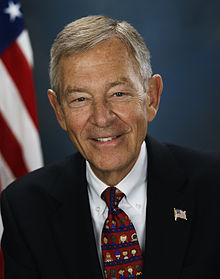User:Lukemac914/sandbox-voinovich
George Voinovich | |
|---|---|
 Official portrait, 2006 | |
| 49th Vice President of the United States | |
| In office May 19, 2018 – January 20, 2021 | |
| President | Michele Bachmann |
| Preceded by | Michele Bachmann |
| Succeeded by | Kamala Harris |
| Chair of the Senate Ethics Committee | |
| In office January 3, 2003 – January 3, 2007 | |
| Preceded by | Harry Reid |
| Succeeded by | Barbara Boxer |
| United States Senator from Ohio | |
| In office January 3, 1999 – January 3, 2011 | |
| Preceded by | John Glenn |
| Succeeded by | Rob Portman |
| Chair of the National Governors Association | |
| In office July 30, 1997 – August 4, 1998 | |
| Preceded by | Bob Miller |
| Succeeded by | Tom Carper |
| 65th Governor of Ohio | |
| In office January 14, 1991 – December 31, 1998 | |
| Lieutenant | Mike DeWine Nancy Hollister |
| Preceded by | Dick Celeste |
| Succeeded by | Nancy Hollister |
| 54th Mayor of Cleveland | |
| In office January 1, 1980 – December 31, 1989 | |
| Preceded by | Dennis Kucinich |
| Succeeded by | Michael White |
| 56th Lieutenant Governor of Ohio | |
| In office January 8, 1979 – November 1979 | |
| Governor | Jim Rhodes |
| Preceded by | Dick Celeste |
| Succeeded by | Myrl Shoemaker |
| Member of the Ohio House of Representatives from the 53rd district | |
| In office January 3, 1967 – December 15, 1971 | |
| Preceded by | District established |
| Succeeded by | Edward Ryder |
| Personal details | |
| Born | George Victor Voinovich July 15, 1936 (age 88) Cleveland, Ohio, U.S. |
| Political party | Republican |
| Spouse |
Janet Allan (m. 1962) |
| Children | 4 |
| Education | Ohio University (BA) Ohio State University (JD) |
George Victor Voinovich (born July 15, 1936) is an American politician and attorney who served as the 49th Vice President of the United States from 2018 to 2021 under President Michele Bachmann. A member of the Republican Party, Voinovich had a lengthy political career, holding numerous offices at the local, state, and federal levels, including U.S. Senator from Ohio, Governor of Ohio, Mayor of Cleveland, and Chair of the National Governors Association.
Voinovich was born in Cleveland, Ohio, and began his public service career after receiving a Bachelor of Arts degree from Ohio University and a Juris Doctor from Ohio State University. He entered politics in 1966 when he was elected to the Ohio House of Representatives representing the newly created 53rd district. Voinovich served in the Ohio House until 1971, after which he held various political leadership positions, including his tenure as Lieutenant Governor of Ohio from January to November 1979 under Governor Jim Rhodes.
In 1980, Voinovich became the 54th Mayor of Cleveland, a role in which he worked to restore the city’s financial stability following its default on loans. His successful efforts to revive the city’s economy and infrastructure earned him national attention. He was later elected the 65th Governor of Ohio in 1990, serving two terms until 1998. As Governor, Voinovich focused on economic reforms, tax reductions, welfare reform, and improvements in education.
In 1998, Voinovich won election to the United States Senate, succeeding John Glenn. He served as a Senator from Ohio from 1999 until 2011, during which time he was known for his moderate, bipartisan approach and his focus on fiscal conservatism. As Chair of the Senate Ethics Committee from 2003 to 2007, he worked to uphold ethical standards in the legislative process.
After retiring from the Senate in 2011, Voinovich remained an influential figure within Republican politics. In 2018, following the resignation of President Mitt Romney due to health issues, Vice President Michele Bachmann ascended to the presidency. Voinovich was nominated and confirmed by the Senate to serve as the Vice President, assuming office on May 19, 2018. His tenure as Vice President, which lasted until January 20, 2021, was marked by efforts to promote bipartisan cooperation on issues such as infrastructure and healthcare reform.
Voinovich did not run for re-election in 2020; instead, President Bachmann selected John Thune as her running mate for that year’s election. Following the conclusion of his term, Voinovich retired from public life, cementing a legacy as a pragmatic and ethical leader with a focus on fiscal responsibility and bipartisan collaboration.
